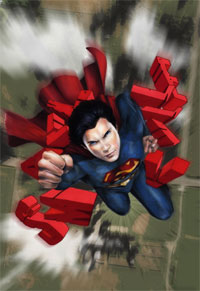Up until recently, I had never really watched the Star Trek series Enterprise, which tells the story of the first warp 5 vessel. When it originally aired, I was turned off by all the sexuality in the pilot, and after that I only saw two more episodes–one in season three and one in season four–because a guy I went to high school with had become one of the background ensigns and I wanted to check it out. But “Hatchery” wasn’t a good stand-alone episode, and the other episode I watched was the Orion slave girl episode…so you can see where I might not have been interested in checking out more of the series. Now, however, Enterprise is available on Netflix, so I figured I’d give it another chance, go back and watch it from the beginning. I started while Sean and I were in New York, and we just finished the four-season series last night.
I loved it. Once I got past the pilot, things started to click for me, and I devoured the first two seasons. I grew to love all the characters. Archer is awesome, of course. I really enjoyed Dr. Phlox, with his open mind and congenial personality and solid ethics. He might actually be my favorite character. And then there’s Hoshi Sato, with whom I had a love-hate relationship that I couldn’t help but try and dissect on Twitter. I wrote that I was glad to see a female character who didn’t fit the modern bad-ass chick stereotype–Hoshi was very smart, and her talents were extremely useful, but she had weaknesses too. She got scared and often started to panic and had to be talked down. Her weakness also frustrated me, of course; I wanted her to just get it done. But it was realistic. She was real. She was a person, and I appreciated that a great deal in this media universe of stock female supersoldiers (and characters of any gender who can somehow handle anything).
The first two seasons introduced the universe to the crew of the Enterprise, focusing on exploration and first contact situations. Those two seasons are my favorites; they embody the soul of the opening credits, which I’ve come to consider a love song to the space program. Faith, strength, curiosity, the need to reach the stars…that’s what Enterprise was about to me.
It was a little jarring when, all of a sudden, Enterprise turned into a show about saving the Earth from an alien Death Star.
It took me some time to adjust to season three. The probe attack on Earth and the following few episodes felt rushed; there were moments that were supposed to be evocative that simply fell flat due to the awkward pacing. I knew I should care about Trip’s sister, but I was still reeling from the abrupt change in format. If I’d been watching the episodes as they aired, I would have been very distressed–and if I’d missed even one episode from the beginning of the Xindi storyline, I would have wondered whether I was even watching the same show. The confusion and unhappiness might have caused me to stop watching. From what I hear from friends, that’s not far from what happened to the Enterprise audience.
But I wasn’t watching as it aired; I had the luxury of going straight to the next episode. I’ve found myself far more forgiving of a show’s foibles when I watch it in marathon sessions. So it wasn’t too long before I got used to season three and even started to enjoy it. I think the writers needed time to adjust as well; the story of each episode felt stronger as the season progressed. By the end, I was totally on board and thrilled to be there. It was intense and the final battle was totally epic and I loved every second of it.
And then there was a mini story arc that I wish had never been inserted, because it did nothing but deus ex the entire Temporal Cold War plotline in the silliest, sloppiest way imaginable. The episodes “Storm Front” and “Storm Front, Part II” are by far the worst episodes of Enterprise, and possibly the worst episodes in all of Star Trek. The cliffhanger that introduced these episodes was inserted into the last few seconds of the final, triumphant episode of season three; it felt like the writers were trying to ensure their survival to another season. I’ve come to abhor this tactic, as it throws real storytelling out the window in favor of audience blackmail. TV writers, I implore you: just write good stories. That’s what we want; that’s what will keep us watching. We don’t want to be coerced. We’re getting tired of it. Eventually there’s always one cliffhanger too many. And I wouldn’t be surprised if this farce lost Enterprise the viewers who had adjusted to the Xindi arc.
After the tale of the time-traveling alien Nazis is over (I told you it was terrible), season four goes right into a very strong, multi-episode arc involving Noonian Soong’s ancestor Arik and some leftover Augments (human supersoldiers). These episodes feature the wonderful Brent Spiner, and Sean and I watched them all at once. The story was wonderful and there was a cute nod at the end to cybernetics being perfected “in the next generation or two”. There are episodes like that in the first two seasons, where things that happen in other Star Trek series are foreshadowed, and it’s always fun. (There were probably many examples I didn’t recognize; I plan to continue watching the Trek series to see what I missed.)
Despite how much I enjoyed the Soong arc, though, I was starting to get a crawly premonition. Enterprise was starting to feel like a different show again. Rather than going back to the season one and two mission of exploration and discovery, or into another war like season three, season four seemed to be transitioning rather rapidly into a show about intergalactic politics and peacekeeping.
Fine, I thought. I could handle a few stories like that. It made sense. The series had to deal with everything that had happened, including new alliances and temporal agent Daniels’ promise that one day Archer would help to form the Federation. But I had a sinking feeling that it wasn’t going to be a few episodes here and there–that the series I’d come to love was lost forever. And I was right. While there were a few stand-alone episodes that evoked the first two seasons, for the most part season four was a series of long story arcs tying humanity into other species and Enterprise into other Trek series. It was good, at times great, and always interesting, but it wasn’t what I’d come to love and expect.
There was another problem with season four that really got on my nerves, and that was retconning Hoshi into a poker playing aikido black belt. There was no indication before season four that Hoshi knew martial arts (other than standard Starfleet hand-to-hand), and she didn’t seem the type to organize ethically dubious poker games and break her CO’s arm over them. I could understand Hoshi gaining confidence in herself after going through what she went through in the Xindi storyline (though honestly an emotional breakdown would have been more in-character), but making self-confidence changes and retconning badassery into her past was going a little too far. It’s possible the writers were responding to criticism of Hoshi; one reviewer apparently dubbed her the series’ “screamer”. But they should have stuck to their guns and continued delivering a believable character rather than succumbing to pressure and resorting to the military chick/Asian martial artist stereotype. (They did backpedal a little toward the end of the show by having Archer and Hoshi recall her former timidity; she admits that she’s just gotten better at hiding her fears. This felt consistent with seasons 1-3 Hoshi but not with season 4 Hoshi.)
While the Terra Prime story arc felt like something out of Babylon 5, I wasn’t unhappy with it. It had a tragic but realistic ending. At that point I just wished I could watch more episodes, see Trip and T’Pol work through what had happened together. I guess they actually didn’t do that, though; if the capstone episode is to be believed, their relationship pretty much ended with that tragedy.
I didn’t have a problem with Riker and Troi (and Data’s voice, and a mention of Reg) being brought into the final episode. The Next Generation was always the most accessible Star Trek to me, optimistic and curious, so it felt almost like coming home to have them round out the show. Thinking about it, I can see where it might be something of an affront to the Enterprise cast; they weren’t allowed to finish their show by themselves, in “real time”, but were instead relegated to a holodeck program for a completely different cast. In that light it might have almost been better to just end one episode sooner. But I liked getting that feeling of continuity, of feeling that what Archer and T’Pol and Trip and Malcolm and Travis and Hoshi and Phlox did existed in the “real” timeline. I don’t want to say it gave the show credibility; I think Enterprise was pretty credible (and in many ways incredible) on its own. But it cemented Enterprise‘s place in Star Trek history, and that was nice to see.
I did sort of wish the show’s conclusion had been more open-ended, though. I’m not the type to flip to the back of a book to see how it ends, so it was a little depressing to learn how Trip dies, and when Enterprise is decommissioned and the adventure is over. The six years between the final two episodes allow room for more stories, but now that I know what ultimately happens, there doesn’t seem to be a point in hearing them. They seem futile and pointless. (Obviously, the idea of “fate” turns my soul to lead.)
I think in season four the show lost its balance; where before it foreshadowed the events of other Trek series, in its final season Enterprise almost became the other Trek series. Too much changed at once. It was almost like skipping ahead a few decades in the timeline. They were good stories, but I’m not sure they matched the people at that point in time. At the beginning of the show, humanity had only just gained the ability to travel to distant systems at a decent speed, and by the end–before the seven-year jump ahead in time–they were brokering peace agreements between species they barely knew. It just seemed a little odd that a crew so reliant on the Vulcan database would suddenly have the knowledge and expertise for the kind of missions seen in The Next Generation, and that the original mission of exploring and increasing Earth’s understanding of the universe would be so quickly bumped down the priority list.
But maybe I’m being hard on season four because I liked the earlier stories better.
In the end, I’m left loving seasons one, two, and even three despite its faltering start…and liking season four a lot, though not on the same level. I wish the show could have continued from season two into more stories about exploration, but I’m happy to have gotten what I did. Thanks to everyone involved with Enterprise: you made a great show with wonderful characters. I look forward to continuing to the other Trek series.
![]() I don’t even want to tell you the context of this image.
I don’t even want to tell you the context of this image.




